-
No-code
Platform
-
Studio
No-code AI-native platform to build applications faster
Discover

-
Studio
-
AI-Native CRM


-
Industries

- Customers
-
Partners

-
About

Understanding AI Marketing Agents: Key Use Cases and Business Impact
Updated on
July 28, 2025
18 min read
Enhance Marketing Workflows With Creatio.ai

Most AI systems today still depend on human prompts to take action, but this is beginning to change with the emergence of agentic AI. According to Gartner, AI agents are expected to independently manage 15% of daily workplace decisions by 2028, up from less than 1% in 2024.
In marketing, this shift is already underway. AI agents are streamlining a wide range of tasks, from campaign execution and lead management to personalisation, content creation, and performance analytics. By automating operations and enabling real-time decision-making, these digital assistants help marketers respond more quickly, work smarter, and focus on driving long-term business growth.
This article explores what AI marketing agents are, outlines their primary use cases and benefits, and offers guidance on identifying the types of AI agents most likely to deliver meaningful results for a business.
What are AI Marketing Agents?
AI marketing agents are intelligent software systems powered by artificial intelligence (AI), capable of making autonomous decisions and carrying out marketing tasks or workflows without human input. Supporting marketing teams across a range of activities – including customer engagement, campaign management, data analysis, content personalisation, and strategic optimisation – these agents operate in real time and align their actions with business objectives.
While generative AI is used to create content, such as text or visuals, and predictive AI helps forecast trends based on data, agentic AI takes things a step further. It is capable of understanding what is happening, making decisions, taking action, and learning from results. For instance, an email generation agent can monitor opens, clicks, and browsing behaviour to automatically refine subject lines, re-segment audiences, and send personalised follow-up messages. This allows marketers to reduce manual effort while improving engagement, conversion rates, and customer retention.
Who Can Benefit from Marketing AI Agents?
AI agents support a wide range of professionals by enhancing marketing efficiency, scaling personalisation, and improving campaign performance through data-driven automation. Roles that benefit most include:
- Chief Marketing Officers (CMOs) and Marketing Executives – to scale marketing performance, reduce operational expenses, and align workflows with broader business strategy.
- Demand Generation Managers – to automate campaign execution, enhance lead nurturing, and drive pipeline growth.
- Marketing Operations Teams – to optimise audience segmentation, lead scoring, testing, and performance monitoring in real time.
- Digital Marketing Specialists – to tailor campaigns across various channels and adapt marketing strategies using live customer data.
- Revenue Operations (RevOps) Leaders – to enhance funnel efficiency and ensure strong alignment between marketing and sales through automated processes.
- Content Marketing Managers – to personalise messaging based on user behaviour, interactions, and journey stage.
- Growth Marketers – focused on rapid iteration, experimentation, and maximising conversion across digital channels.
How AI Agents Support Marketing Operations
As AI agents continue to advance across industries, their value is becoming increasingly difficult to overlook. These autonomous systems can automate execution, make intelligent decisions, and optimise complex workflows to deliver faster, smarter outcomes – all without the need for constant human supervision. It is little surprise that the global AI agent market is expanding rapidly, with projections from Grand View Research estimating growth from $5.4 billion in 2024 to over $50 billion by 2030.
In marketing, AI agents open up a wealth of opportunities. These AI-powered assistants are capable of autonomously analysing vast amounts of both structured and unstructured data to build, execute, and refine marketing processes. Acting as the digital twin of the marketer, AI marketing agents evaluate campaign context, customer interactions, and overarching business objectives to determine and carry out the next-best actions, helping to move each campaign forward.
Marketing AI agents are particularly valuable in areas such as campaign execution, lead nurturing, customer segmentation, and real-time personalisation. By automating time-consuming tasks and adjusting strategies in real time, they enable teams to enhance campaign performance, improve ROI, and increase customer satisfaction – all without increasing staffing levels or operational complexity.
8 Most Popular Use Cases for AI Marketing Agents
According to the KPMG’s global AI survey, 51% of organisations are actively exploring the use of AI agents, while 37% have already begun deploying them in real-world scenarios. In marketing, AI agents are proving especially powerful – enabling data-driven decisions that enhance campaign performance and scale personalisation efforts.
Below are some of the leading use cases where AI marketing agents are delivering measurable results:
Real-Time Audience Segmentation and Targeting
With countless interactions occurring across various channels each day, every customer leaves behind a mix of distinctive behaviours and common intent signals. The key to effective marketing lies not only in who is targeted, but also in understanding when, how, and why.
AI marketing agents continuously analyse engagement patterns, purchase intent, and behavioural signals across channels to refine segments dynamically. They activate high-intent audiences, suppress disengaged users, and ensure targeting is aligned to the moment of greatest relevance – all without requiring manual oversight.
Outcome: Smarter audience targeting that enhances relevance, boosts conversion rates, and improves campaign ROI.
Autonomous Campaign Execution and Optimisation
Beyond simple scheduling, AI agents autonomously manage live campaigns across email, paid advertising, and social media platforms. They continuously monitor engagement and refine campaign elements – such as messaging, visuals, delivery timing, and budget allocation – in line with marketing objectives and established best practices for each specific campaign. These optimisations may be executed automatically or presented for human review, offering marketers full control while reducing the need for ongoing manual intervention.
Outcome: Campaigns remain fully optimised from launch to completion, minimising the need for direct involvement and improving overall effectiveness.
Content Personalisation and Orchestration
Marketing AI agents personalise content delivery throughout the entire customer journey, including selecting and sequencing emails, offers, landing pages, and creatives based on customer behaviour and data-driven insights. These AI assistants support marketing teams in maintaining consistency across channels while adapting tone, format, and timing to fit each individual user and specific campaign objective.
Outcome: Consistent and relevant messaging across all channels that enhances engagement and builds trust at scale.
Lead Qualification and Nurturing
AI agents analyse and assess leads using behavioural signals, firmographic data, and engagement history to determine their readiness to convert. They score and qualify prospects in real time, automatically route sales-ready leads, and personalise nurture journeys for other lead segments. To increase the likelihood of conversion, AI agents can autonomously optimise marketing campaigns by adjusting messaging, timing, and channels based on sentiment, intent, or recent interactions.
Outcome: Higher-quality pipelines and smoother, more productive handovers between marketing teams and sales representatives.
Automated Testing and Optimisation
AI marketing agents enable continuous experimentation by testing different marketing elements – such as subject lines, offers, creative assets, and layouts – across various campaigns. High-performing variants are promoted automatically, while underperforming ones are phased out, all in response to real-time performance data. Unlike manual testing, AI-driven optimisation allows for rapid iteration and automated performance tracking, enabling marketers to adjust campaigns dynamically for maximum impact.
Outcome: Continuously improving campaigns that deliver stronger results, informed by data rather than guesswork.
Intelligent Budget Allocation
Marketing AI agents analyse campaign spend and ROI across channels such as paid search, social media, email, and more – as campaigns are running. They monitor key performance indicators, including CPC, CPA, CTR, and conversions in real time, identifying which channels deliver the greatest business value.
For instance, if Facebook ads are underperforming while Google Search or retargeting yield stronger results, the AI agent can automatically reallocate budget towards the higher-performing channels, pause ineffective ad sets, adjust bidding, or surface recommendations for marketer approval.
This approach provides teams real-time visibility into performance and the ability to adjust spend accordingly.
Outcome: Improved budgeting choices, guided by real-time insights, to drive stronger results with fewer inefficiencies.
Insight-to-Action Analytics
AI marketing agents go beyond simply reporting on performance – they support marketers deciding what to do next, and frequently take action themselves. By examining data across campaigns, customer behaviour, and wider business objectives, AI agents surface valuable recommendations that may otherwise be overlooked.
Whether it is refining targeting strategies, testing a new content approaches, or initiating an additional campaign channel, AI agents guide teams with context-aware suggestions – or act independently when rapid response is required.
Outcome: Reduced time spent reviewing data, with greater focus on making timely, informed decisions that deliver real results.
Core Business Benefits of AI Agents for Marketing
AI agents are more than mere tools for automating workflows – they act as intelligent digital assistants, supporting marketing teams through quicker, evidence-based decisions, boosting productivity, and delivering highly personalised customer journeys at scale. When embedded within the wider marketing technology stack, AI agents provide a number of meaningful business advantages, including:
- Enhanced Team Efficiency: by automating repetitive tasks such as segmentation, testing, reporting, and optimisation, AI agents allow marketers to concentrate on higher-value work related to strategy and creativity.
- Deeper, Insight-Driven Decisions: through ongoing analysis of campaign data, customer interactions, and contextual signals, AI agents uncover patterns and opportunities that may not be immediately evident, and can act on them promptly when required.
- Scalable Personalisation: whether you are reaching an audience of one thousand or one million, AI agents tailor messaging, timing, and content to each individual with precision – without the need for human input from your team.
- Stronger Alignment Between Strategy and Execution: unlike traditional rule-based AI systems, AI agents operate with purpose. These autonomous assistants interpret business goals and core marketing objectives to ensure that their actions remain aligned with desired outcomes at all time.
- Always-On Optimisation: AI agents continually monitor, test, and refine marketing campaigns without the need to pause for human approval. They identify underperformance early and act promptly to keep outcomes moving in the right direction.
By automating execution, supporting informed decision-making, and delivering consistently high-quality experiences, AI-powered agents enable marketers to maintain efficiency and stay focused on driving meaningful business results.
Leading Platforms with Integrated AI Agents for Marketing
With a clearer understanding of how AI agents function and the value they offer marketers, the next step is selecting the right platform to put these capabilities into practice.
Today’s leading marketing solutions extend far beyond standard automation. The most competitive platforms now feature embedded AI capabilities across campaign delivery, personalisation, optimisation, and analytics. Below are some of the most widely adopted platforms that offer integrated AI agent functionality, designed to support high-performing marketing teams.
Platform | Best for | G2 Rating |
| Creatio | All-in-one AI-native platform for marketing workflow automation and CRM | 4.6/5 |
| Microsoft Dynamics 365 | The enterprise-level solution to dive deep into customer insights with AI tools | 4.0/5 |
| Salesforce | AI CRM to manage customer data, sales, and marketing operations for large enterprises | 4.4/5 |
| HubSpot | AI-powered customer platform for sales, marketing, services, and operations for growing businesses | 4.4/5 |
| Pipedrive | Sales-focused CRM with AI-powered tools for small to mid-sized teams | 4.3/5 |
| Zoho | CRM suite with Agentic AI capabilities for SMB segment | 4.1/5
|
Creatio
Creatio is an AI-native platform that enables organisations to automate industry workflows and CRM through powerful no-code tools and a unified AI core. By embedding generative, predictive, and agentic AI directly within the platform, Creatio allows users to design, deploy and optimise business processes more swiftly and more intelligently – while retaining full control.
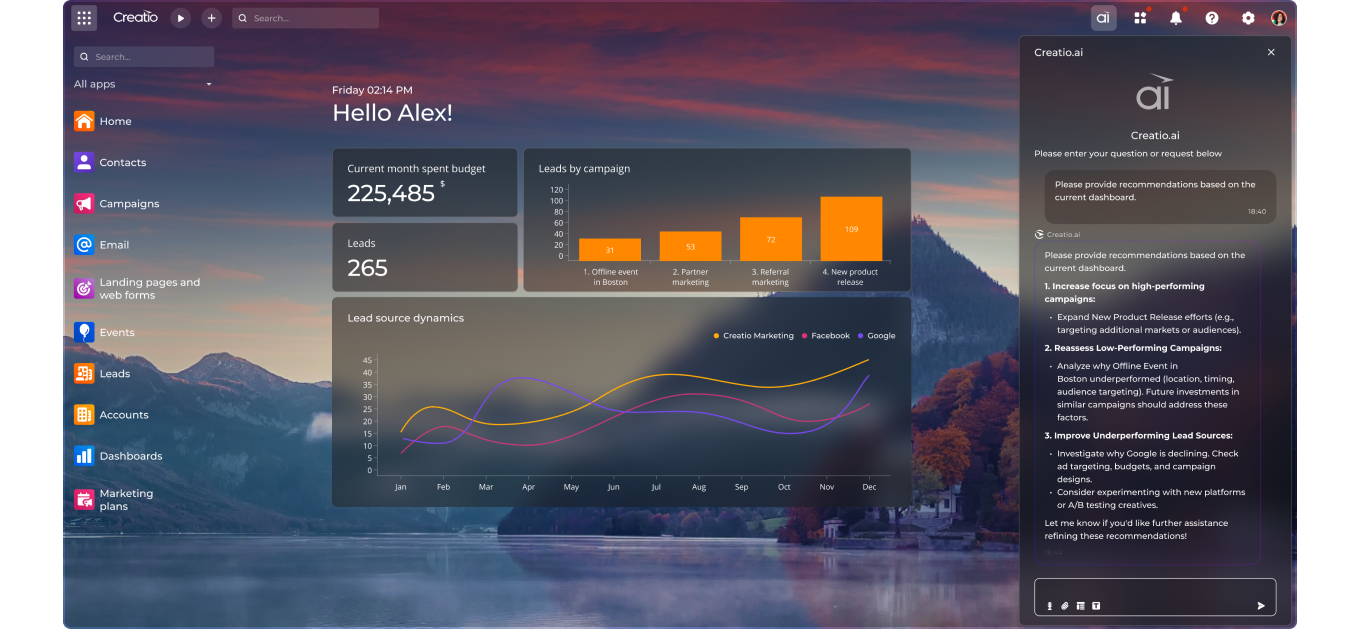
Within Creatio Marketing, AI agents play a pivotal role in streamlining campaigns, personalising customer journeys, and enhancing performance across every touchpoint. These intelligent agents automate execution, refine workflows, and adapt in real time, enabling marketers to remain focused on strategy and outcomes.
Creatio Marketing is powered by the following AI Agents:
- Marketing Content Agent: generates on-brand, ready-to-use content drafts and templates for campaigns, newsletters, and landing pages.
- Email Generation Agent: crafts and optimises email copy tailored to the brand voice, audience behaviour, and campaign objectives.
- Lead Conversion Agent: scores and prioritises leads in real time, routing high-potential prospects to sales and personalising nurture flows for others.
- No-Code Agent Builder: empowers teams to develop bespoke AI agents for unique marketing processes without writing a single line of code.
Creatio’s embedded AI architecture allows AI agents to operate with full awareness of customer data, campaign history, and workflows, ensuing they act in context and optimise results autonomously. With built-it conversational AI, marketers can engage with AI agents using natural language, executing actions and retrieving valuable insights directly via a chat interface.
Enable by the platform’s AI-assisted No-Code capabilities, users across the organisation can build, customise, and update AI agents and workflows with ease – all without technical expertise. From a business perspective, this results into faster innovation, deeper personalisation, and significantly reduced dependency on IT resources.
Creatio Marketing is part of Creatio’s unified CRM suite, alongside Creatio Sales and Creatio Service, enabling seamless end-to-end automation throughout the entire customer lifecycle. These AI-powered products can be deployed as a comprehensive, all-in-one CRM platform or as standalone solutions tailored to the organisation’s specific requirements. In addition, with access to over 700 third-party applications and integrations, the platform’s capabilities can be further extended to support a wide range of unique business needs.
Distinguishing Features
- Marketing AI Agents for Content, Emails, and Lead Conversion: automate content creation, email personalisation, and lead conversion processes with agentic AI support
- Customer 360 View: obtain a comprehensive, real-time view of each contact and account, including omnichannel engagement history, to enable highly personalised, context-aware interactions throughout the customer journey.
- Lead Management Automation: utilise AI-driven tools to accelerate lead lifecycle management and improve conversion rates.
- Campaign Management: plan, budget, deliver, and monitor complex, omnichannel marketing campaigns with full visibility and control.
- Email Marketing Automation: launch and optimise personalised email campaigns across varied audience segments.
- Digital Advertising Management: manage the full lifecycle of digital advertising campaigns, with capabilities for audience targeting, budget control, and ROI monitoring.
- Event Management: simplify the planning and execution of both virtual and in-person events, track attendee engagement, and seamlessly integrate event data into the pipeline and marketing strategy.
Considerations
- Advanced customisation may present a learning curve for users unfamiliar with no-code development environments.
Pricing
Creatio offers a transparent pricing model across all its plans: Growth (~£18), Enterprise (~£41), and Unlimited (~£63) per user per month. All plans include full access to the platform's AI capabilities. Each of the CRM products – Sales, Marketing, and Service – is priced at ~£11 per user per month, and can be purchased separately or as a part of the complete suite. Each module includes, built-in product-specific AI agents to augment human teams and accelerate results.
A free trial and personalised demo are also available to explore the platform’s core capabilities.
Rating
- G2: 4.6
- Capterra: 4.7
Try Creatio AI Marketing Agent

Microsoft Dynamics 365
Microsoft Dynamics 365 Customer Insights – Journeys is an enterprise-grade marketing platform that combines customer data, journey orchestration, and AI-powered assistance. It is designed to enable marketers to deliver connected, personalised experiences across multiple channels such as email, SMS, push notifications, and paid media, ensuring the deep integration of the tool with the Microsoft ecosystem.
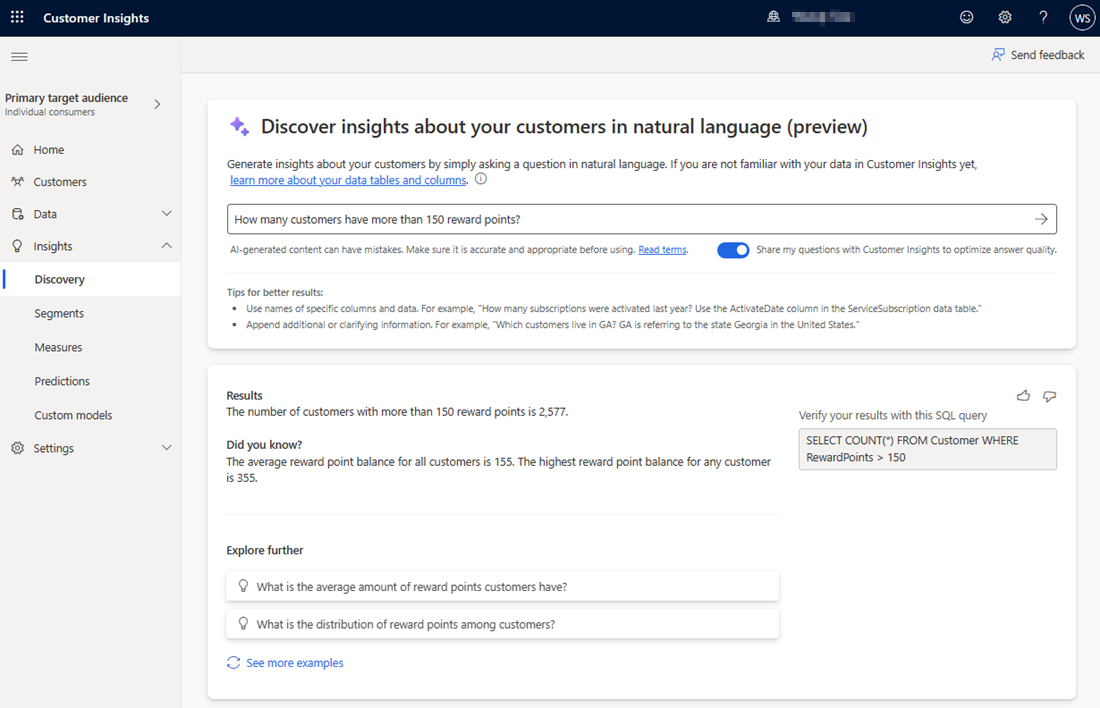
Although the platform does not yet support fully autonomous AI agents, Microsoft incorporates generative and predictive AI through Copilot, an embedded assistant powered by artificial intelligence. Copilot enables teams to generate content, design customer journeys, segment audiences, and analyse campaign performance using natural language prompts. It provides real-time recommendations and helps streamline campaign execution and optimise workflows with greater speed and efficiency.
Distinguishing Features
- Copilot AI assistant for email content generation, user journey refinement, and audience segmentation
- Prebuilt AI models for subject lines, content personalisation, and image selection
- Customer journey orchestration across email, mobile, social, and advertising channels
- Predictive scoring for evaluation of lead and engagement potential with built-in dashboards
- Native integrations with Microsoft Teams, Outlook, and Dynamics 365 Sales for cross-team collaboration
Considerations
- Copilot is not a fully autonomous AI agent and still requires human prompts and oversight
- May be overly complex for smaller teams or organisations with relatively simple marketing requirements
- Licensing costs can be significant, particularly when scaling usage across multiple departments
Pricing
Dynamics 365 Customer Insights – Journeys is priced from ~£1,266 ($1,700) per tenant per month as a standalone product. Additional charges may apply for optional features such as Unified People and Interacted People packs.
Rating
- G2: 4.0
- Capterra: 4.4
Salesforce
Salesforce is a widely adopted customer relationship management (CRM) platform, offering comprehensive solutions for sales, customer support, and marketing operations. Its core CRM includes standard features such as dynamic email marketing and analytics. More advanced marketing automation capabilities are provided through Salesforce Marketing Cloud.
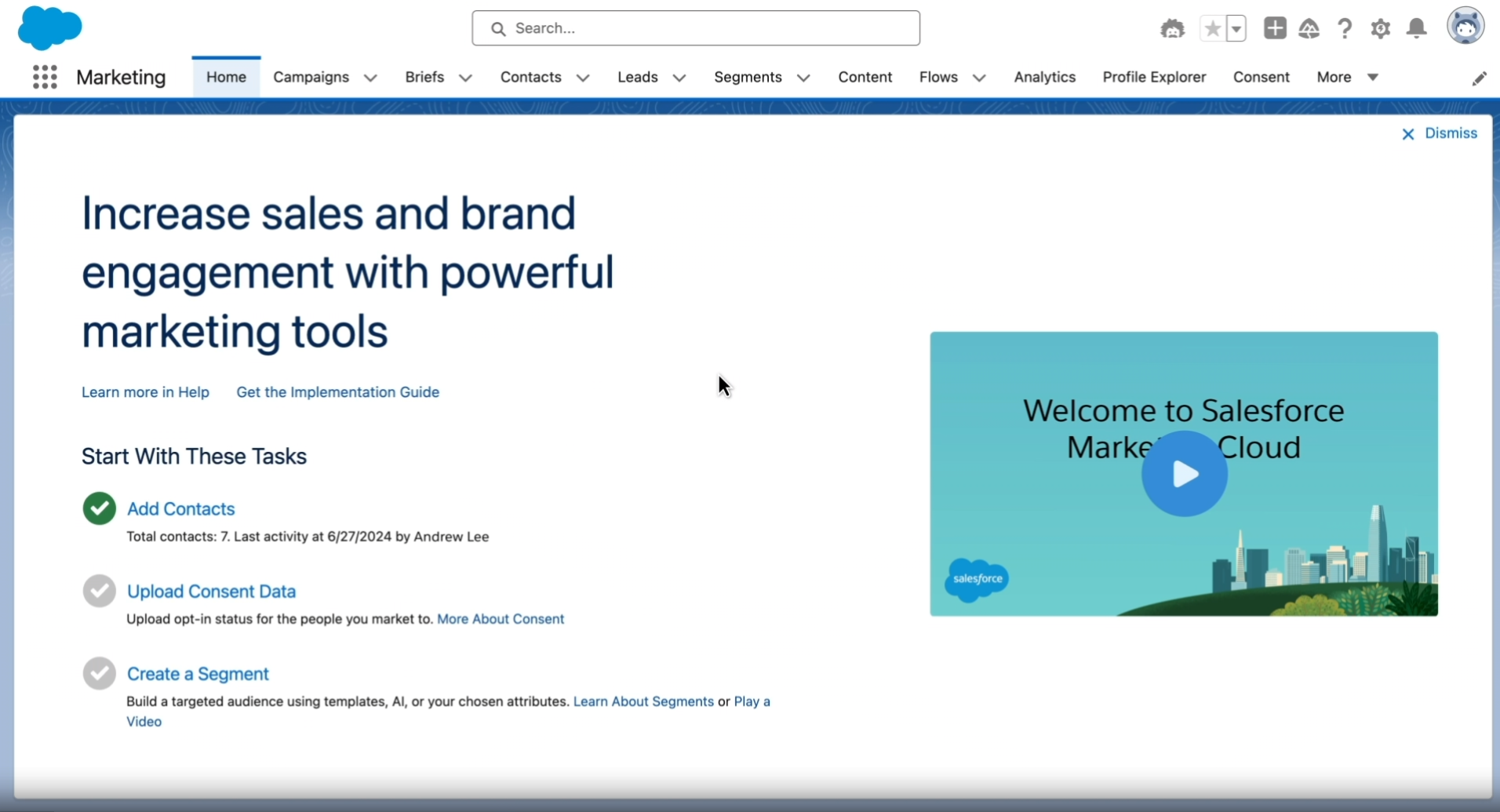
Salesforce’s agentic AI functionality is delivered via Agentforce – an AI system designed to autonomously manage specific marketing operations, including campaign briefing, audience segmentation, email and SMS generation, and journey analysis in flow. Agentforce is tightly integrated with Salesforce's CRM and other cloud-based services, enabling AI-driven execution aligned with key business processes.
It is worth noting, many of the more advanced AI agent features are only accessible within higher-tier Marketing Cloud plans. Further capabilities can be unlocked through additional paid modules, such as expanded AI request capacity, increased email and SMS limits, and advanced personalisation tools.
Distinguishing Features
- Agentforce Campaigns to build and execute campaigns using generative AI prompts
- Drag-and-drop email builder with send-time optimisation for improved engagement
- Lead generation forms and landing page builder featuring a straightforward UX
- Multi-channel journey mapping to automate campaigns across email, SMS, social media, and advertising (available in Growth and Advanced editions)
- Dynamic content personalisation and A/B testing for enhanced conversion rates (available in Growth and Advanced editions)
Considerations
- Complex configuration and a steep learning curve may delay implementation and onboarding process
- Access to AI agent functionality requires higher-tier plans
- Primarily suited to large enterprises with substantial marketing budgets
Pricing
Salesforce’s basic CRM plans start at ~£19 ($25) to ~£74 ($100) per user per month, suitable for small teams. The enterprise-level AI CRM – Marketing Cloud – begins at ~£2,421 ($3,250) per organisation per month. Most agentic AI features, such as predictive scoring and path optimisation, are only available in the Advanced Edition.
Rating
- G2: 4.4
- Capterra: 4.4
HubSpot
HubSpot is a widely adopted platform designed for growing businesses seeking an all-in-one solution to manage campaigns, streamline operations, and foster strong customer relationships. It is particularly well regarded for its intuitive interface, comprehensive content tools, and seamless integrations across marketing, sales and service.
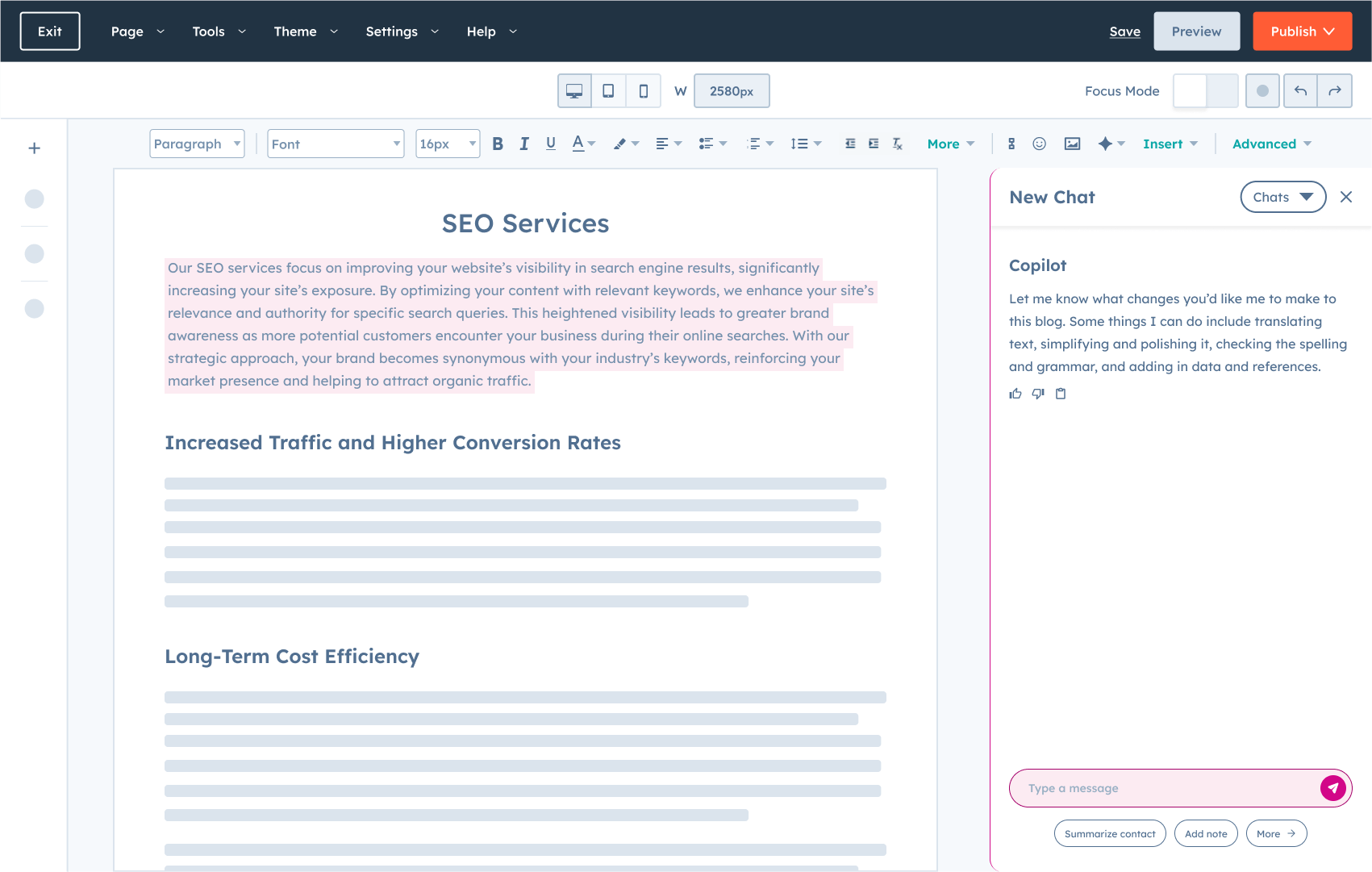
HubSpot offers a range of AI features – including Breeze Copilot, Breeze Intelligence enhancements, and product-specific AI Agents – which can be integrated across its Hubs and the Customer Platform. The intelligent Copilot supports marketing teams with tasks such as building workflows, summarising and enriching CRM records, and creating landing pages. Although its capabilities in agentic AI are not yet as advanced as some competitors, it provides a solid suite of AI-powered tools that help marketers work more efficiently and deliver personalised campaigns. Within the Marketing Hub, the Breeze Social Agent enables teams to generate social posts that reinforce brand voice, streamline social media management, and target diverse audiences.
Distinguish Features
- Social Agent (for Marketing Hub) to automate social media posting
- Breeze Copilot assistant that supports users in creating workflows, summarising CRM records, and generating content
- Messaging insights to analyse high-performing marketing messaging that boost engagement
- Data enrichment to automatically populate contact and company properties to maintain current and accurate records.
- Intent analysis to identify and score buyer intent signals, enabling teams to prioritise leads effectively
Considerations
- Professional and Enterprise pricing plans do not include the required one-off onboarding fee, which ranges from ~£2,235 ($3,000) to ~£18 ($7,000).
- Pricing may increase rapidly depending on contact volume and features selected.
- The platform’s Agentic AI capabilities remain limited in comparison with other providers
Pricing
HubSpot’s Marketing Hub begins at ~£15 ($20) per user per month. However, to access the AI agent functionality tailored for marketers, businesses will need to subscribe to the Professional – ~£596 ($800), and Enterprise – ~£2,628 ($3,600) plans. AI credits (formerly Breeze Intelligence AI credits) are available as an add-on, starting at ~£33 ($45) for 5,000 credits per month.
Rating
- G2: 4.4
- Capterra: 4.5
Pipedrive
Pipedrive is a sales-oriented CRM tailored for small to mid-sized teams, providing tools for lead tracking, email outreach, and pipeline management. While its primary functionality centres on sales operations, the platform also supports basic marketing functions, including email campaign management, contact segmentation, and web form creation – helping businesses align marketing with broader strategic initiatives.
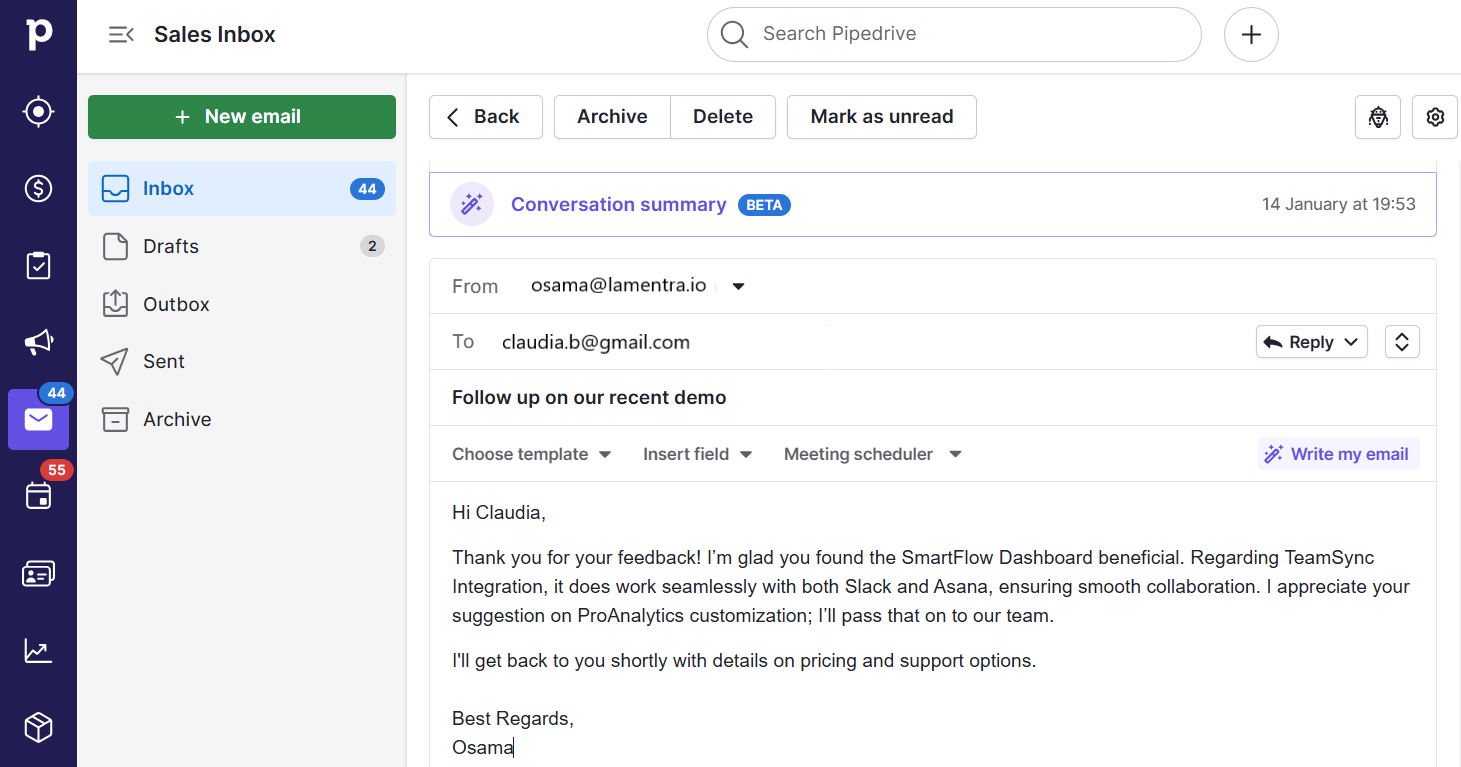
Pipedrive has recently introduced several AI-powered agents aimed at enhancing productivity and strengthening customer loyalty. Notably, its Email Agent can prioritise inboxes, summarise threads, and generate email drafts based on prior conversations and brand voice. In addition, the Knowledge Base Agent provides actionable guidance derived from the CRM data, supporting users in executing daily tasks more efficiently.
Distinguishing Features
- Email agent for consistent, highly personalised customer communication
- Knowledge Base agent to provide actionable insights on CRM data and guide users through routine tasks
- Campaigns by Pipedrive for managing bulk emails, newsletters, and contact segments (available as a paid add-on)
- LeadBooster for web chat, chatbot automation, and lead qualification (available as a paid add-on)
- Customisable workflows to automate follow-ups and nurture flows for leads
Considerations
- Primarily designed for sales; marketing automation features are relatively limited
- AI agents are largely focused on email management tasks
- Fewer advanced AI and orchestration capabilities compared to enterprise-level platforms
- Campaigns and LeadBooster require additional add-on purchases
- Advanced customisation in only available with the Professional plan or above
Pricing
Pipedrive’s pricing begins at ~£14 ($19) per seat per month for the Essential plan. Access to AI-powered features such as the Sales Assistant and Campaigns tool are included in higher-tier plans, which start from ~£48 ($64) per user per month and above.
Rating
- G2: 4.3
- Capterra: 4.5
Zoho
Zoho is a widely used CRM and marketing automation platform that enables teams to streamline sales, marketing, and customer engagement within a single place. The platform is primarily geared towards small to mid-sized businesses, offering straightforward, easy-to-use tools for email marketing, lead management, campaign execution, and analytics – all designed to enhance teams efficiently across multiple channels.
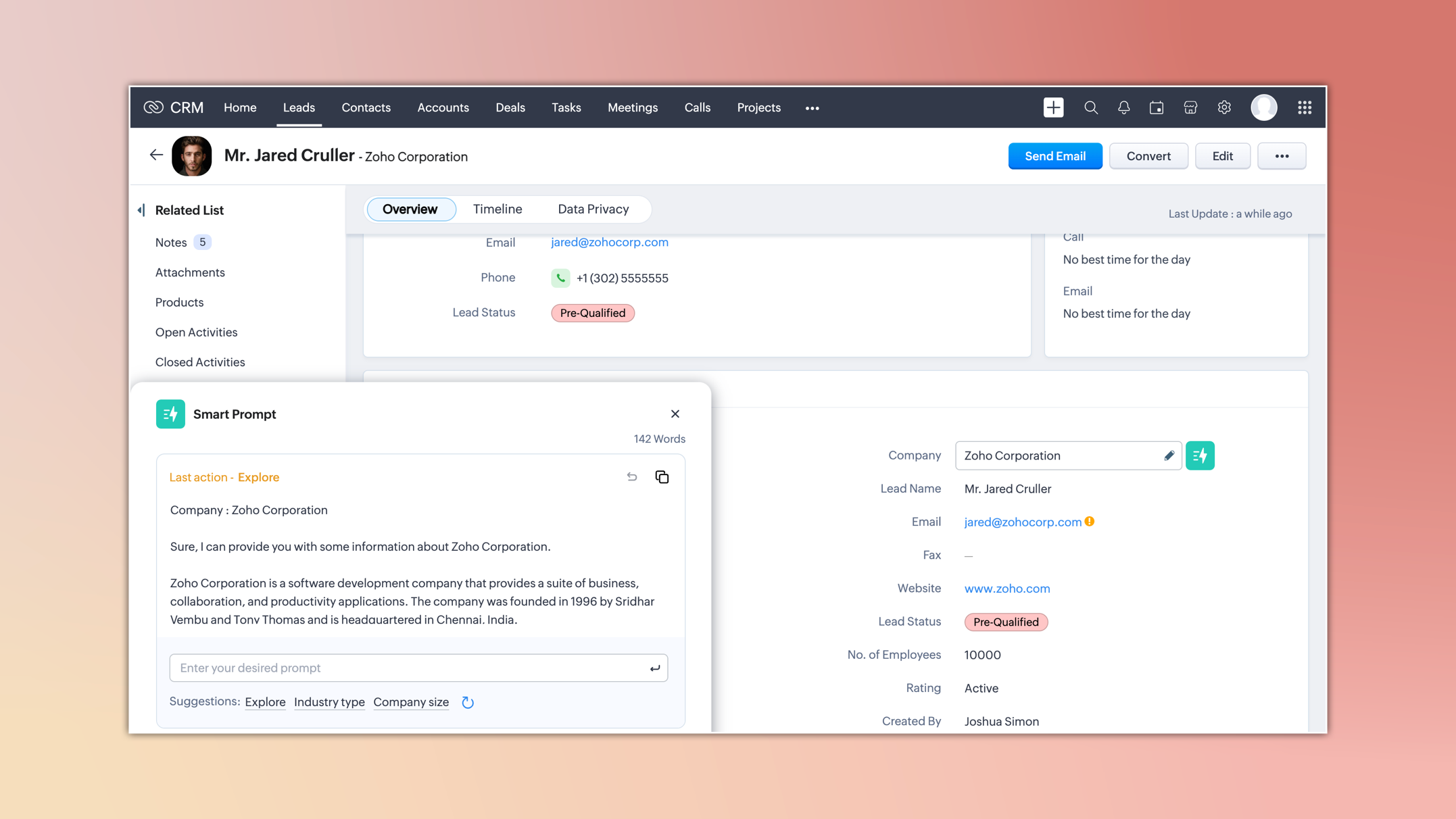
Zoho’s built-in AI agent, Zia, supports marketers in improving productivity thorough intelligent recommendations, lead scoring, and performance forecasting. For instance, Zia can assist in detecting patterns in campaign data, suggesting optimal times to send emails, and identifying actionable insights based on the collected data – enabling teams to generate and nurture leads more effectively.
Distinguishing Features
- Zia AI agent for lead predictions, anomaly detection, and AI-powered email content suggestions.
- Campaign management to run and monitor email, social, and webinar campaigns from a single platform.
- Email management with sentiment and intent analysis, enrichment features, and content summarisation
- Intelligent alerts and reminders to stay on top of tasks, meetings, and call activities
- Extensive integrations with third-party vendors and products within the Zoho ecosystem
Considerations
- Zia’s capabilities are available only on the Enterprise and Unlimited plans
- Limited functionality for enterprise-level requirements – it may be overly simplistic for some organisations
- Some features are supported exclusively in English or require a minimum of 15 users to access
Pricing
The platform’s pricing begins at ~£15 ($20) per user per month, covering standard CRM features. However, to access the AI assistant functionalities, organisations should consider the higher-tier plans: Professional ~£26 ($35) per user per month (includes only Zia’s email marketing functionality) or Enterprise ~£37 ($50) per user per month with full AI capabilities.
Rating
- G2: 4.1
- Capterra: 4.3
The Future of AI Technologies in Marketing: Trends for 2026 and Beyond
The increasing integration of AI-powered technologies is opening up new opportunities to enhance marketing effectiveness, automate complex processes, and deliver improved customer experiences. Moving past basic scripted automation, AI agents are enabling businesses to operate with greater speed, adaptability, and intelligence.
Gartner outlines several key trends expected to shape the next phase of AI in marketing:
- Enhanced Creativity and Hyper-Personalised Experiences at Scale. AI is empowering marketers to deliver highly relevant experiences by generating personalised content dynamically, aligned with brand guidelines and real-time user behaviour. This allows teams to dedicate more time to strategic planning and creative tasks, while delegating all the routine workflows to AI.
- Influence AI to Guide Customer Decisions. Influence AI involves the use of intelligent algorithms that proactively shape user choices by optimising digital experiences in real time. By interpreting emotional cues, behavioural signals, and generated content, this AI technology presents tailored choices that gently steer users towards preferred campaign outcomes, all while maintaining a seamless and intuitive experience.
- Streamlined Operations Through Agentic Automation. AI agents are expected to assume greater responsibility for core marketing operations such as audience segmentation, campaign execution, testing, and budget allocation. These intelligent agents operate in real time, adapt continuously, and function with minimal supervision – allowing marketing teams to scale performance, maintain consistency, and improve ROI.
According to a recent AI survey by KPMG, 51% of companies globally are actively exploring the use of AI agents within their operations, while 37% have already begun trialling them in real-world scenarios.
Harness the Power of AI Agents for Marketing with Creatio
Marketing AI agents go well beyond basic task automations – they enable teams to scale personalisation, enhance performance, and remain closely with strategic objectives. From dynamic audience targeting to omnichannel campaign delivery, these agents bring real-time intelligence into every aspect of the marketing function.
Creatio Marketing provides a unified AI stack, incorporating generative, predictive, and agentic AI, embedded directly within the Creatio platform, with no additional cost across any plan. Its AI agents support a wide range of activities, including email campaign planning, audience segmentation, personalised content creation, meeting scheduling, and productivity optimisation. These capabilities empower marketing professionals to operate with greater speed and intelligence. With customisable AI skills, teams can align AI agents to suit the unique workflows, strategies, and business goals, delivering maximum impact while maintaining complete oversight throughout the entire marketing lifecycle.
Start unlocking your AI advantage today. With Creatio, marketers can plan and execute campaigns faster, smarter, and with a sharper focus on business outcomes — all without increasing staffing levels or operational complexity.

